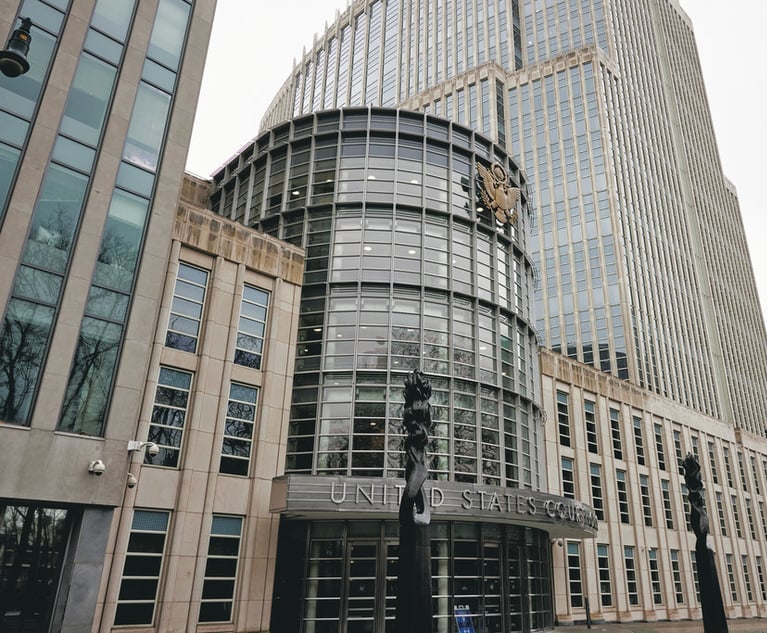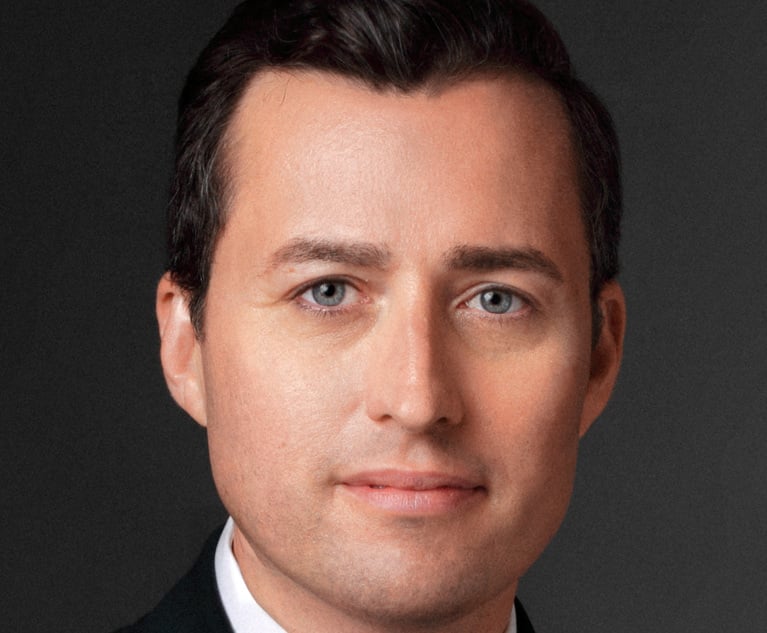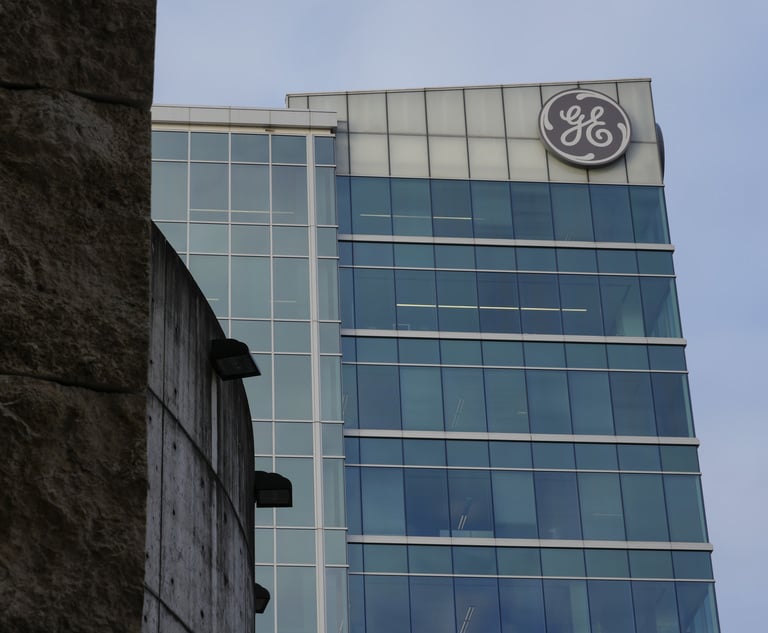As Telemedicine Expands, Insurance Fraud Grows
Telemedicine will no doubt continue to play an expanded role in the health care system. Yet both practitioners and insurers should be aware of the potential for abuse of these telemedicine services and the criminal, civil and administrative ramifications.
September 01, 2022 at 10:30 AM
9 minute read
Insurance With the strong support of regulators, including in New York, telemedicine has significantly expanded since the beginning of the COVID-19 pandemic. See, e.g., New York State Department of Health, Comprehensive Guidance Regarding Use of Telehealth Including Telephonic Services; Governor Hochul Announces $3 Million in New Grants To Expand Access to Telehealth across All New York Regions.
With the strong support of regulators, including in New York, telemedicine has significantly expanded since the beginning of the COVID-19 pandemic. See, e.g., New York State Department of Health, Comprehensive Guidance Regarding Use of Telehealth Including Telephonic Services; Governor Hochul Announces $3 Million in New Grants To Expand Access to Telehealth across All New York Regions.
At the same time, the opportunities for fraud have increased. Unscrupulous international and domestic telemarketing call centers, staffing companies, marketers, brokers and practitioners, among other individuals and entities, have recognized the potential to line their pockets, and many have done so—and continue to do so.
Consider the charges brought several months ago against an orthopedic surgeon who was indicted in federal court in Brooklyn for what prosecutors characterized as a $10 million telemedicine health care fraud. According to the government, the surgeon purported to practice telemedicine with telemedicine companies that paid him $25 or $30 for each consultation he had with a Medicare or Medicare Part D beneficiary. Prosecutors alleged that the surgeon signed prescriptions and order forms for durable medical equipment (DME), including orthotic braces, that were not medically necessary. The government contended that the surgeon caused the submission of these claims based solely on a short telephone conversation for beneficiaries he had not physically examined and evaluated, and that were induced, in part, by the payments of bribes and kickbacks.
This content has been archived. It is available through our partners, LexisNexis® and Bloomberg Law.
To view this content, please continue to their sites.
Not a Lexis Subscriber?
Subscribe Now
Not a Bloomberg Law Subscriber?
Subscribe Now
NOT FOR REPRINT
© 2025 ALM Global, LLC, All Rights Reserved. Request academic re-use from www.copyright.com. All other uses, submit a request to [email protected]. For more information visit Asset & Logo Licensing.
You Might Like
View All
Insurance Company Sues Over 180 Health Care Providers for Fraud Under RICO
3 minute read
New York Court of Appeals Tightens Pleading Standards Against Insurance Policyholder
7 minute read
Amid Growing Litigation Volume, Don't Expect UnitedHealthcare to Change Its Stripes After CEO's Killing
6 minute read
GE Agrees to $362.5M Deal to End Shareholder Claims Over Power, Insurance Risks
2 minute readLaw Firms Mentioned
Trending Stories
- 1Uber Files RICO Suit Against Plaintiff-Side Firms Alleging Fraudulent Injury Claims
- 2The Law Firm Disrupted: Scrutinizing the Elephant More Than the Mouse
- 3Inherent Diminished Value Damages Unavailable to 3rd-Party Claimants, Court Says
- 4Pa. Defense Firm Sued by Client Over Ex-Eagles Player's $43.5M Med Mal Win
- 5Losses Mount at Morris Manning, but Departing Ex-Chair Stays Bullish About His Old Firm's Future
Who Got The Work
J. Brugh Lower of Gibbons has entered an appearance for industrial equipment supplier Devco Corporation in a pending trademark infringement lawsuit. The suit, accusing the defendant of selling knock-off Graco products, was filed Dec. 18 in New Jersey District Court by Rivkin Radler on behalf of Graco Inc. and Graco Minnesota. The case, assigned to U.S. District Judge Zahid N. Quraishi, is 3:24-cv-11294, Graco Inc. et al v. Devco Corporation.
Who Got The Work
Rebecca Maller-Stein and Kent A. Yalowitz of Arnold & Porter Kaye Scholer have entered their appearances for Hanaco Venture Capital and its executives, Lior Prosor and David Frankel, in a pending securities lawsuit. The action, filed on Dec. 24 in New York Southern District Court by Zell, Aron & Co. on behalf of Goldeneye Advisors, accuses the defendants of negligently and fraudulently managing the plaintiff's $1 million investment. The case, assigned to U.S. District Judge Vernon S. Broderick, is 1:24-cv-09918, Goldeneye Advisors, LLC v. Hanaco Venture Capital, Ltd. et al.
Who Got The Work
Attorneys from A&O Shearman has stepped in as defense counsel for Toronto-Dominion Bank and other defendants in a pending securities class action. The suit, filed Dec. 11 in New York Southern District Court by Bleichmar Fonti & Auld, accuses the defendants of concealing the bank's 'pervasive' deficiencies in regards to its compliance with the Bank Secrecy Act and the quality of its anti-money laundering controls. The case, assigned to U.S. District Judge Arun Subramanian, is 1:24-cv-09445, Gonzalez v. The Toronto-Dominion Bank et al.
Who Got The Work
Crown Castle International, a Pennsylvania company providing shared communications infrastructure, has turned to Luke D. Wolf of Gordon Rees Scully Mansukhani to fend off a pending breach-of-contract lawsuit. The court action, filed Nov. 25 in Michigan Eastern District Court by Hooper Hathaway PC on behalf of The Town Residences LLC, accuses Crown Castle of failing to transfer approximately $30,000 in utility payments from T-Mobile in breach of a roof-top lease and assignment agreement. The case, assigned to U.S. District Judge Susan K. Declercq, is 2:24-cv-13131, The Town Residences LLC v. T-Mobile US, Inc. et al.
Who Got The Work
Wilfred P. Coronato and Daniel M. Schwartz of McCarter & English have stepped in as defense counsel to Electrolux Home Products Inc. in a pending product liability lawsuit. The court action, filed Nov. 26 in New York Eastern District Court by Poulos Lopiccolo PC and Nagel Rice LLP on behalf of David Stern, alleges that the defendant's refrigerators’ drawers and shelving repeatedly break and fall apart within months after purchase. The case, assigned to U.S. District Judge Joan M. Azrack, is 2:24-cv-08204, Stern v. Electrolux Home Products, Inc.
Featured Firms
Law Offices of Gary Martin Hays & Associates, P.C.
(470) 294-1674
Law Offices of Mark E. Salomone
(857) 444-6468
Smith & Hassler
(713) 739-1250






